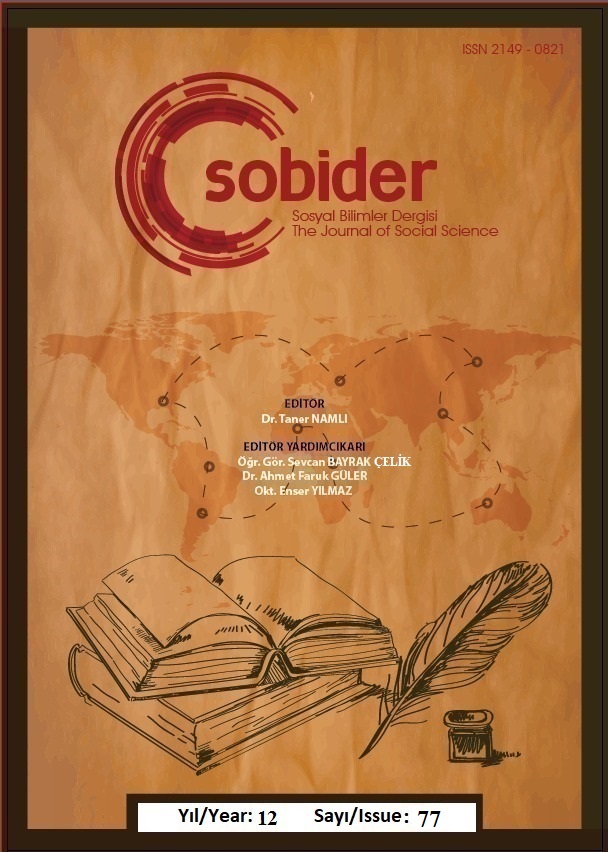Author :
Abstract
Makalenin amacı dijital sanatın taklitten yapay zekaya doğru evrilen yaratıcı yolculuğunu incelemektir. Dijital sanat, başlangıçta geleneksel sanat eserlerinin bilgisayar yardımıyla taklit edilmesiyle başlamış ancak dijital teknolojilerin hızla gelişmesiyle birlikte daha karmaşık ve özgün üretim süreçlerine dönüşmüştür. Bilgisayar yazılımları ve dijital araçlar, sanatçılara geleneksel yöntemlerin ötesinde geniş yaratıcılık olanakları sunmuş, bu da dijital sanatın evriminde önemli bir rol oynamıştır. Dijital sanat, yalnızca sanat eserlerinin üretim yöntemlerini değil, aynı zamanda sanatçı ile izleyici arasındaki etkileşimi de yeniden tanımlamaktadır. Teknolojik yenilikler, sanatın sergilenme ve tüketim biçimlerini değiştirerek hem yaratıcı süreci hem de sanatsal deneyimi dönüştürmüştür. Dijital sanatın bu bağlamda çağdaş sanat anlayışına getirdiği yenilikler, sanat dünyasında geniş yankı uyandırmıştır. Yapay zekanın sanat üzerindeki rolü, bir üretim aracı olmanın ötesine geçerek, sanatçının estetik kararlarını yönlendiren bir unsur haline gelmiştir. Araştırmanın bu noktada dijital sanatın sanatçılar ve sanat izleyicileri üzerindeki etkilerini derinlemesine incelemesi, yapay zekanın sanat üretim süreçlerinde nasıl bir dönüşüm yaratacağını ortaya koyacaktır. Gelecekte dijital sanatın nasıl şekilleneceğine dair önemli bilgilere ulaşılması hedeflenmektedir. Ayrıca, dijital sanatın toplumsal algısını ve sanatın değerine yönelik değişen kavramları ele almak da bu araştırmanın temel amaçlarındandır. Dijital sanatın tarihsel gelişimi, yapay zekanın sanattaki etkileri ve bu dönüşümün sanatçılar üzerindeki sonuçları detaylı bir şekilde incelenecektir. Bu sayede, dijital sanatın gelecekteki potansiyeli ve toplumsal etkileri üzerine kapsamlı bir perspektif sunulması amaçlanmaktadır.
Keywords
Abstract
The aim of the article is to examine the creative journey of digital art evolving from imitation to artificial intelligence. Digital art initially started with the imitation of traditional artworks with the help of computers, but with the rapid development of digital technologies, it has evolved into more complex and original production processes. Computer software and digital tools have provided artists with a wide range of creative possibilities beyond traditional methods, which has played an important role in the evolution of digital art. Digital art redefines not only the production methods of artworks, but also the interaction between the artist and the audience. Technological innovations have transformed both the creative process and the artistic experience by changing the way art is exhibited and consumed. In this context, the innovations brought by digital art to the understanding of contemporary art have had a wide resonance in the art world. The role of artificial intelligence on art has gone beyond being a means of production and has become an element that directs the aesthetic decisions of the artist. At this point, the in-depth examination of the effects of digital art on artists and art viewers will reveal how artificial intelligence will transform art production processes. It is aimed to reach important information about how digital art will be shaped in the future. In addition, addressing the social perception of digital art and the changing concepts of the value of art are among the main objectives of this research. The historical development of digital art, the effects of artificial intelligence on art and the consequences of this transformation on artists will be analysed in detail. In this way, it is aimed to provide a comprehensive perspective on the future potential and social effects of digital art.





